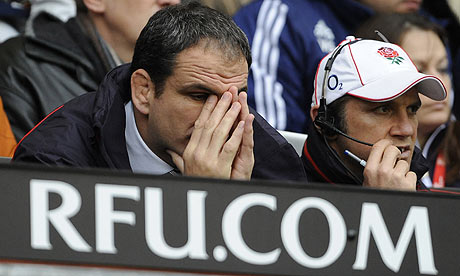
This was not a game so sterile that not a single germ escaped. Far from it; at half-time the boos were loud, a vile emanation from the mouths of the doubting, a coating of viral derision on Twickenham's lifeless cabbage patch.
The early arrival of Christmas suggests an act of generosity, but here it was just the premature parade of a turkey, a stinker that made the stuttering Wales-Samoa of Friday night look like a riot of hyper-activity.
Wales played in custard yellow and England in burgundy plum, nauseous shades that should be banished from the colour charts.
Argentina, playing their first Test since June, a long way from home and with all of five days' preparations under their belts, could take, like Samoa, credit from their performance. They made mistakes, none more glaring than the dropped catch by Juan Martín Fernández Lobbe, who might lay claim to the safest pair of hands in the world in normal conditions, but at least the No8 and captain recovered to lead from the front with high energy and enthusiasm, and an obvious level of comfort on the ball.
Such comfort was in short supply in the England ranks. Mark Cueto looked good, but apart from the wing's penetration there was very little moving at pace in the right direction.
Lewis Moody, in such a muddled game, shone as only he can, a sort of twirling blur of limbs, chasing and tackling and not for once giving away too many penalties. He played his part, too, in the game's only try, slipping the final pass to Matt Banahan, a touch of eyes-open skill to complement his eyes-shut devotion to destruction elsewhere.
To show how freakish the try was, it contained a burst by Steve Borthwick, the first gain of yards by an England tight forward in two matches and by the forward who is mocked most for his lack of thrust with ball in hand.
James Haskell, who had dropped as much as he had caught until this 10-minute package of fun at the very end, made the first inroads and the captain was on his shoulder to drive on and offload.
Borthwick will be panned again as the leader of an outfit who failed to deliver any sort of entertainment, but deserves a mention for his burst. Even if it was only two yards in length. This was a day when any small mercy was received with childlike appreciation.
There was a roar – not a frequent sound – for any catch made by Ugo Monye, a cheer for a movement of three passes, a positive shriek of delirium for the try. And long applause at the final whistle, not to thank England for the victory, but to thank the referee for putting this game out of its misery.
At one stage this season, it seemed that Martin Johnson was succeeding in his quest to knock a team of individuals into a team. Collective skills come before any personal talent. You only have to listen to how often the French refer to "le collectif" to appreciate that rugby can only be played in large units.
But this was a day dominated by individual weakness. True, the scrum that was meant to crumble before Puma propping power held up well, but this was a reaction to a known threat. When it came to being proactive, England hit the skids.
Monye's career seems destined to be one of ups and downs. He recovered from his first Test nightmare with the Lions in South Africa, where he fluffed two tries, to emerge stronger and wiser. Here, he looked lost again, diffident, unwilling to claim the ball.
He forced himself to make one good run, but this was the exception to the general rule of inefficiency under the high ball. There is an obvious injury crisis in England, but something just as debilitating seems to have gripped the squad: good players are frightened to express themselves; the shell has become a refuge just at the time when, in games that are only friendlies after all, the opportunity is there to open up.
Dylan Hartley, for example, is a player brought up a long way from the suffocation of the England method. He's from Waikato, where fear of open space is drummed out of players at the earliest levels of development. Here, in the crucible of his adopted homeland, he had the confidence to appear in midfield, but manifested only the habit of putting his head down and clattering into defenders who stopped him easily. It was never suggested to him, surely, that he should play like an England centre of the 1970s.
In the end, it was a crying shame that the second-half siesta was interrupted by the scoring flurry of the try and conversion, the kick landed by Jonny Wilkinson, who was not immune to his team's tightening of the blinkers. After a normal first-half service of a drop goal and long penalties, he kicked inaccurately, the exception being the final, simple conversion.
The game would have been meaningful had the most miserable of tryless draws been the result. Argentina would have celebrated and England would have been shamed into change. As it is, they can point to the result and take a version of satisfaction from it. But the truth is that, as long as the germ-heavy booing can be stopped, the only purpose for Twickenham at the moment is as a mass isolation ward. As Monye might say, no chance of catching anything here.

